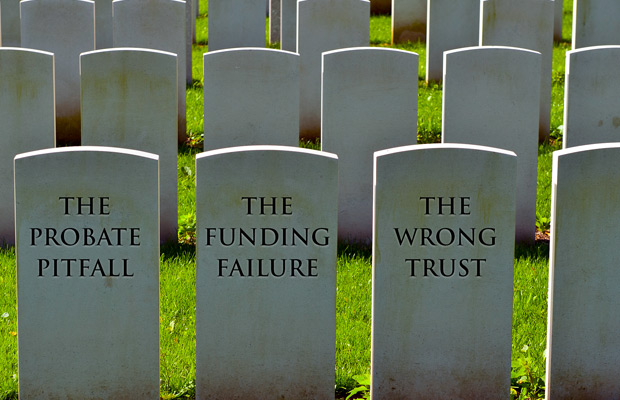Estate Planning Horror Stories

There is nothing worse than thinking you have everything in order but learning – often when it’s too late to do anything about it – that you really don’t. It almost feels like I imagine a character in a horror movie might feel when he thinks he’s escaped danger. He closes his eyes and takes a deep breath, only to find that the monster he was trying to avoid is standing right behind him. There are a lot of monsters to avoid in the maze of estate planning.
The Probate Pitfall
Probate is the court process through which the final affairs of a person are processed after that person dies. In Arkansas, probate is a long, public, expensive process, and anyone who knows anything about it wants to do everything possible to avoid it.
Thankfully, avoiding probate isn’t as difficult as you might think. But unfortunately, one planning technique that many people use (thinking it’s all they need) is the last will and testament. Many people don’t realize that having a last will and testament does nothing to avoid probate court; in fact, a will is actually a set of instructions for how a person wants his or her probate to go.
Admittedly, having a last will and testament is better than not having one. Without a will, your final affairs will be administered in probate according to generic state statutes enacted decades ago. But many people spend a lot of time and money putting together their wills thinking they will keep them out of probate court, and that’s just not the case.
To make sure your estate does not wind up in probate court, you have to ensure that you do not have assets in your name when you die. That does not mean that you should give everything away before you die; it means that you should title your assets in the name of a trust, which acts as a will replacement but does not have to go through probate court.
The Funding Failure
Some folks who know a little bit about the probate pitfall—enough to compel them to have a trust drawn up—still wind up in probate because they just don’t finish the job. To me, failing to fund a trust may be worse than not setting up a trust in the first place because, with this monster, you actually put the time and money into a trust and rely on it to keep you out of the probate pitfall, but it doesn’t.
The reason some people have trusts but still wind up in probate court is something called trust funding. A trust will only keep out of probate those assets that are titled in the name of that trust, or assets that are set to automatically pass on death to the trust through a death beneficiary designation. Michael Jackson is a celebrity example of someone who failed to fund his trust and, as a result, is wasting a tremendous portion of his estate on attorneys’ fees and probate costs. But this isn’t a mistake reserved for celebrities or people with huge estates. Simply failing to have a deed prepared that transfers your home from you as an individual to your trust will throw your estate into probate court even if you have a trust.
The Wrong Trust
One more estate planning horror story rears its ugly head more often than it should, and that’s the situation where a family has a trust, and they even fund it correctly, but they have the wrong trust for the situation they ultimately face in life.
There are many types of trusts, but the main two categories of trusts are revocable (which can be amended or changed at any time) and irrevocable (which cannot be amended or changed once created). Both trusts work equally well at keeping estates out of probate court, but only an irrevocable trust can also shelter assets from the high costs of long-term care, like nursing home costs or the fees associated with assisted living. A revocable trust does nothing to shelter assets from long-term care costs.
It is certainly a sad story when you meet a family who has had a properly funded trust for years, thinking that it will protect their assets from long-term care costs, only to learn when long-term care needs arrive, that the type of trust they had won’t do the job they thought it would.
Be absolutely certain that you have the right estate planning documents for your situation, and ensure that they are set up the right way to do what you need them to do. Don’t find yourself in an estate planning horror story.









0 comments